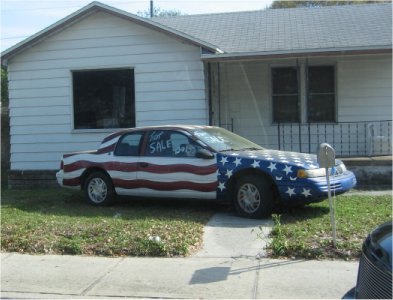Forbes: "The Best Way to Boost the Economy With Your Next New-car Purchase is to Buy a Domestic-branded Model Manufactured in North America With the Highest Percentage of American-made Parts"
Bengt Halvorson's thesis for Newsweek/MSNBC/Forbes is a predictable, plodding piece of work. The dietribe [sic] makes a stab at exploring the muddy waters surrounding domestic vs. transplant "issue." "For instance, the Chevrolet Equinox, which is assembled in Ontario, has an engine made in China and a transmission from Japan, which brings its domestic content down to 55 percent. The Chrysler PT Cruiser is assembled in Mexico, has a Mexican-made engine and only 37 percent domestic content. Yet the Japanese-branded Toyota Sienna minivan, with a West Virginia-built engine and transmission, and a final assembly in Indiana, boasts 85 percent domestic content." Rather than negotiate a sensible path through this maze– screw it, it's a global economy, buy some Toyota shares, get over it– Halvorson's propagates the propaganda perpetuated by the " Level Field Institute." [This pro-domestic lobby group, run by United Auto Workers retirees, rightly points out that The Big 2.8 account for more U.S. jobs than transplants so that you'll consider rewarding their incompetence by buying a Korean-built Chevrolet Aveo.] Halvorson's "don't buy anything but Motown product" summary [as above] arrives in the third paragraph. His list of acceptable American cars are all made by GM, Ford and Chrysler. Well, it's supposed to. The embedded link to the "10 Most Patriotic Vehicles" takes you straight to the Honda DX Civic Sedan, one of the ten "Least Expensive Vehicles to Own." Funny, that.
More by Robert Farago


































Comments
Join the conversation
Who supplies the bulk of the Sonata's parts? American, Japanese, or Korean sourced suppliers?
Yeah, I will stick with my 100% made in Japan Forester. Call me crazy but I enjoy a vehicle that is reliable and holds its resale value.
Whether domestic or foreign or a mix of both, vehicles have to be powered by something. If it is oil, we import over half of it. When we do wealth flows out of the U.S. economy and into the hands of oil exporters, many of whom do not like us very much to put it mildly. Perhaps the best way to support the American economy is to drive less or do without a car if possible. Failing that, running your car E85 keeps a very large share of the wealth at home. Even E10 helps out a little. As the Post Peak Oil world unfolds it is likely that globalization will have to decline due to expensive oil and the costs of shipping parts around the globe. It may be that at some point it will become uneconomic to have other than domestically produced cars. These cars will be made by foreign companies but will have high domestic content to save on transport costs. The Detroit 2.8 would have had a home court advantage, but they are so screwed up product and management wise that it won't help. It will probably be that foreign producers like Toyota will be producing cars of high domestic content Post Peak Oil. They will be small, fuel efficient cars like the Yaris or the Prius which Detroit seems incapable of competitively producing.